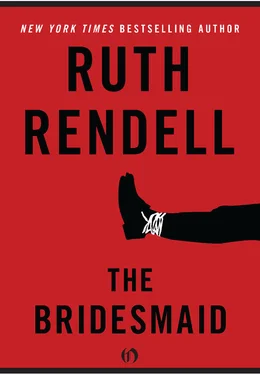Ruth Rendell - The Bridesmaid
Здесь есть возможность читать онлайн «Ruth Rendell - The Bridesmaid» весь текст электронной книги совершенно бесплатно (целиком полную версию без сокращений). В некоторых случаях можно слушать аудио, скачать через торрент в формате fb2 и присутствует краткое содержание. Год выпуска: 2010, Издательство: Open Road Integrated Media LLC, Жанр: Триллер, на английском языке. Описание произведения, (предисловие) а так же отзывы посетителей доступны на портале библиотеки ЛибКат.
- Название:The Bridesmaid
- Автор:
- Издательство:Open Road Integrated Media LLC
- Жанр:
- Год:2010
- ISBN:нет данных
- Рейтинг книги:3 / 5. Голосов: 1
-
Избранное:Добавить в избранное
- Отзывы:
-
Ваша оценка:
- 60
- 1
- 2
- 3
- 4
- 5
The Bridesmaid: краткое содержание, описание и аннотация
Предлагаем к чтению аннотацию, описание, краткое содержание или предисловие (зависит от того, что написал сам автор книги «The Bridesmaid»). Если вы не нашли необходимую информацию о книге — напишите в комментариях, мы постараемся отыскать её.
The Bridesmaid — читать онлайн бесплатно полную книгу (весь текст) целиком
Ниже представлен текст книги, разбитый по страницам. Система сохранения места последней прочитанной страницы, позволяет с удобством читать онлайн бесплатно книгу «The Bridesmaid», без необходимости каждый раз заново искать на чём Вы остановились. Поставьте закладку, и сможете в любой момент перейти на страницу, на которой закончили чтение.
Интервал:
Закладка:
Seeing Arnham’s car had at last shown him what he avoided facing. The man was home, had very likely been home for months. He had moved house without giving Christine his new phone number. He had ditched her—“jilted” her would probably be the term Christine’s own generation would use. The evenings were beginning to grow light, and it was possible to see from the french windows the birdbath and the patch of concrete where Flora had stood. Philip stood at the window, remembering Christine’s enthusiasm at the idea of bringing the statue to Arnham as a gift.
She came into the room with the plates of potatoes and beans. Water had slopped onto the tray from overfilled glasses. He quickly took it from her. His mother did her best. It was only—dreadful accusation!—that she did nothing well except emotional things. She was good at loving a man and good at making children feel safe and happy. Those functions came naturally to her. She couldn’t help being expensive to keep, a waste-maker, one of those people who cost more by earning than they would by doing nothing.
They watched television. This obviated for a while the need to talk. It was still only seven. He looked unseeing at the screen, where a dancer in lamé and feathers capered about. Christine, he noticed, her tray balanced on her lap, had surreptitiously opened her Brides magazine again and was looking longingly at ridiculous photographs of girls in white satin crinolines. Even Fee herself didn’t want that, was resigned to a homemade wedding dress and what the caterers called a “finger buffet.” They would all share the cost, but even so … And there was Christine still hankering after a thousand quid’s worth of bridal gown, a sit-down dinner, and a disco.
She was looking at him. It occurred to him that in the whole of his twenty-two years of life he had never known her to be angry. And when she anticipated anger from others, her face wore that particular expression it wore now, the eyes afraid, the lips parted in the beginnings of a hopeful, mollifying smile. He said to her, “Is there any point in leaving that card there any longer?” It was a roundabout way of asking what he didn’t want to ask and knew the answer to, anyway.
She turned pink, looked away. “You can take it down if you want to.”
Would she have given him that terrible yet naive reason for her continued hope if Fee hadn’t come in at that moment? But Fee did come in, sweeping in swiftly like a human breeze, the front door banging first, then the living room one behind her. She looked at their trays, turned up the television, then turned it off, dropped into an armchair, her arms hanging down over its sides.
“Have you had anything to eat, dear?” Christine said.
If Fee had said no and what was there, Christine would have been hard put to it to produce even a sandwich. But she routinely enquired and Fee almost always gave an impatient shake of the head.
“I can’t understand why people don’t do things. Why don’t they do what they say they’ll do? Can you believe it, Stephanie hasn’t even started on her dress yet and she’s supposed to be making Senta’s as well.”
“Why can’t Senta make her own?” Philip asked, though he wasn’t much interested in the activities of his sister’s bridesmaids.
“If you knew Senta, you wouldn’t have to ask that. It’s quite funny actually, the idea of her sewing anything.”
“Is that the one that’s Darren’s cousin?”
Fee nodded in the way she had that made you think your enquiry irritated her. And then she grinned, wrinkling up her nose, looking at him as if they were conspirators. He realised quite suddenly how much he dreaded her departure from this house. There were only three weeks to go to her wedding and then she would be gone, never to return. Cheryl was useless, Cheryl was never at home. He would be alone with the responsibility of Christine, and what guarantee had he now that this state of affairs would ever end, that he would ever be free? He kept seeing Arnham’s car, parked there at the foot of the windowless, ivy-clad wall. Perhaps, like Christine, he had believed, or half believed, that Arnham had never come back, that he was unaccountably still in America. Or ill. Ill in hospital somewhere for months and unable to get in touch. Or even that he had died. He jumped up and said he was going to take Hardy out, take him a bit further than the usual evening ambulation round the block. Would Fee come too? It was a fine mild evening, very warm for April.
They walked along the pavements between the grassy patches with budding trees and the boundary walls of little square gardens. The grid of streets extended half a mile this way and half a mile that and then merged into Victorian sprawl. At one of the crossroads, waiting while Hardy investigated with exploratory sniffs a pair of gateposts and ceremoniously lifted his leg against them, Philip began to talk about Arnham, about seeing his car that day and therefore knowing now that he had simply deserted Christine. He had become indifferent to her.
Unexpectedly, Fee said, “He really ought to give Flora back.”
“Flora?”
“Well, don’t you think he ought? Like giving back an engagement ring when you break things off, or returning letters.” Fee was an ardent reader of romantic fiction. She would need to be, marrying Darren, Philip sometimes thought. “She’s valuable, she’s not a plastic garden gnome. If he doesn’t want to face Mum, he ought to send her back.”
This seemed ridiculous to Philip. He wished Christine had been less impetuous in the first place and never decided to present Arnham with this unsuitable gift. They crossed the road, the dog obediently by their side until they reached the opposite pavement, where he began to run on ahead, but decorously, his tail maintaining a constant, cheerful wagging. Philip thought how strange it was, the different lights in which people saw things, even a brother and sister as close as he and Fee. He saw Arnham’s offence in his encouraging Christine to love him and his abandonment of her. Then Fee surprised him by showing how nearly they did see eye to eye. She also shocked him.
“She thought he’d marry her, she thought that for ages,” Fee said. “And do you know why? I don’t suppose you do, but you know Mum, how sort of strange she is, like a child sometimes. I may as well tell you. You could say she confided in me, but she didn’t say I wasn’t to tell you.
“Tell me what?”
“You won’t let on to her I told you, will you? I mean, I think she told me because of being her daughter. It’s sort of different, a son, isn’t it? She just came out with it, out of the blue. It’s why she was certain he’d marry her.” Fee’s eyes returned to his face. They were almost tragic. “I mean, any other woman wouldn’t feel that way or she’d think just the reverse, especially someone her age, but you know Mum.”
Philip really didn’t have to be told any more. He felt a flush spread up his neck across his face. His face was burning and he put his cold hand up to touch the skin. If Fee noticed, she gave no sign of it.
“That time he came here and she cooked a meal for them or got takeaway or something and we were all out somewhere, well, he—they— they had sex, made love, whatever you call it. In her bedroom. Suppose one of us had come in? It would have been very embarrassing.”
He thrust his hands into his pockets and walked, looking down. “I wish you hadn’t told me.” The turmoil inside him frightened him. It was as if he were jealous as well as angry. “Why did she tell you?”
Fee had put her arm through his. He gave her no answering pressure; he was suddenly upset by physical contact. The dog ran on ahead. It was the hour of dusk when, briefly, everything appears clear and defined but with an unearthly, very chilly pale light.
Читать дальшеИнтервал:
Закладка:
Похожие книги на «The Bridesmaid»
Представляем Вашему вниманию похожие книги на «The Bridesmaid» списком для выбора. Мы отобрали схожую по названию и смыслу литературу в надежде предоставить читателям больше вариантов отыскать новые, интересные, ещё непрочитанные произведения.
Обсуждение, отзывы о книге «The Bridesmaid» и просто собственные мнения читателей. Оставьте ваши комментарии, напишите, что Вы думаете о произведении, его смысле или главных героях. Укажите что конкретно понравилось, а что нет, и почему Вы так считаете.











